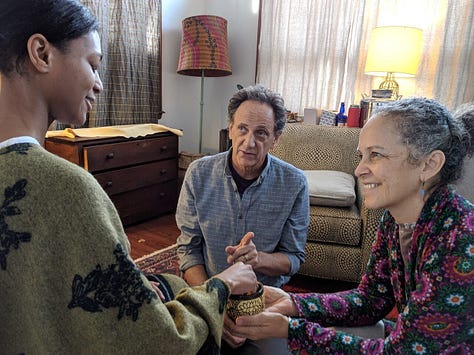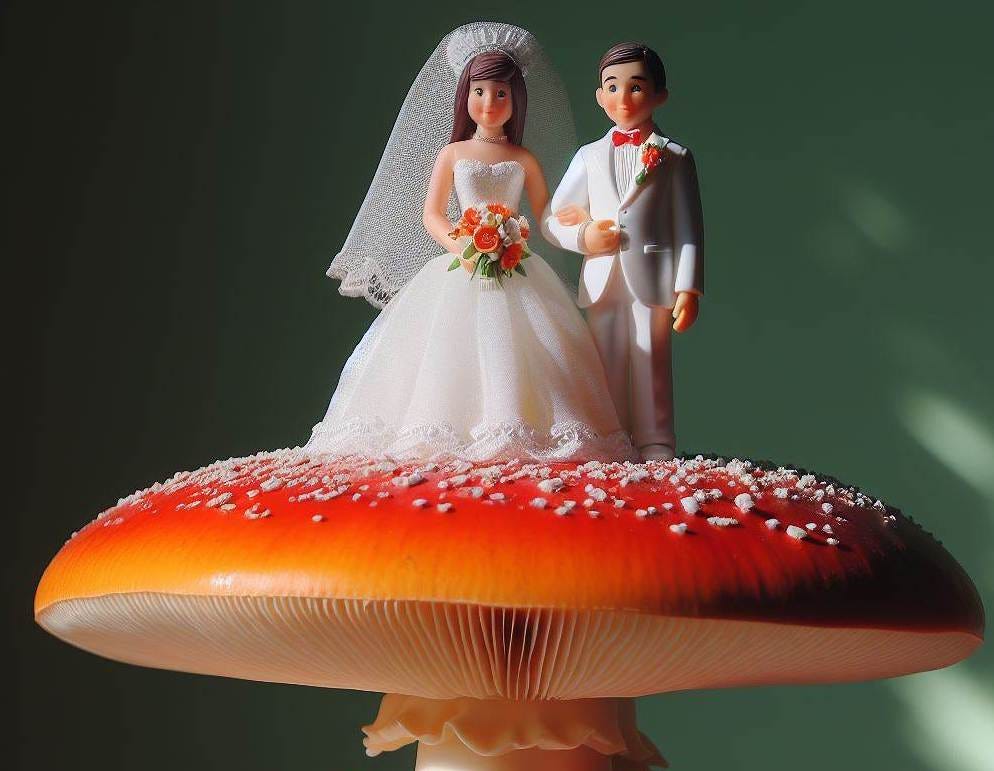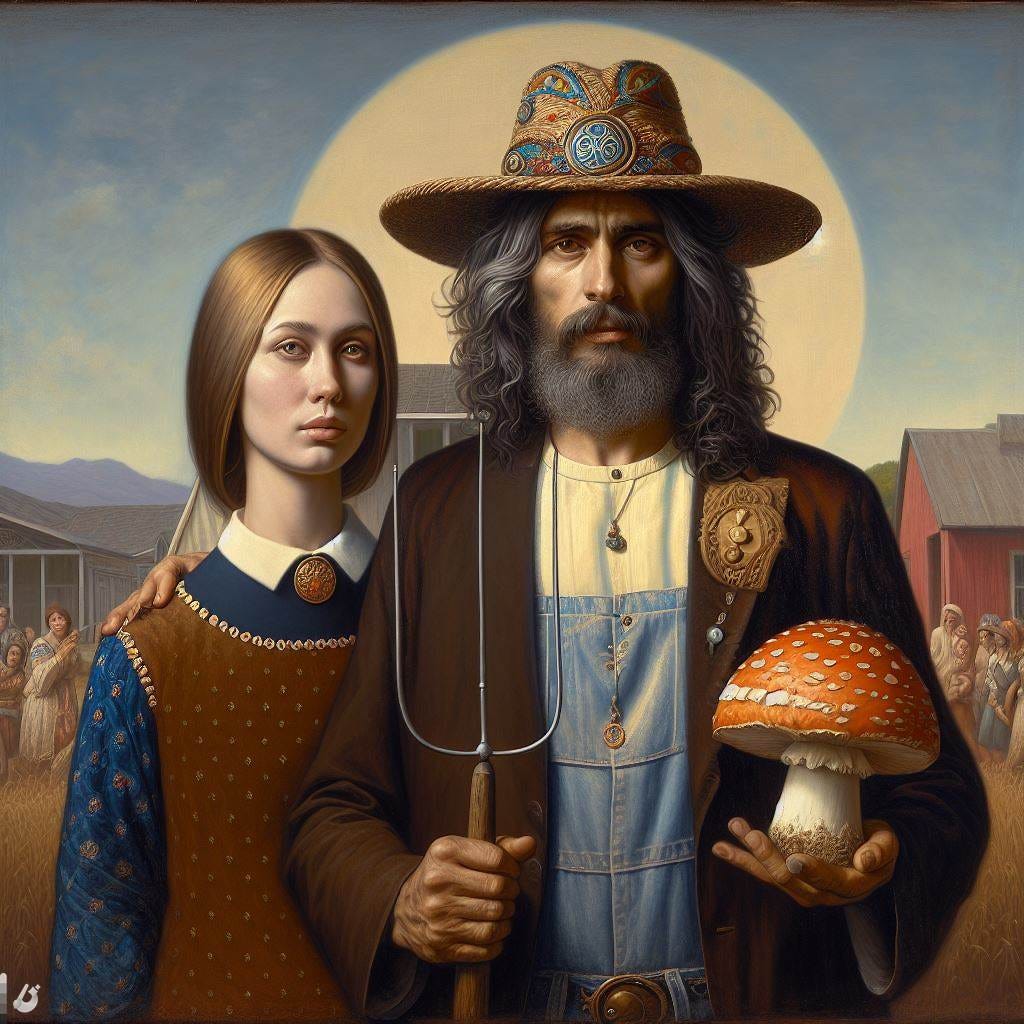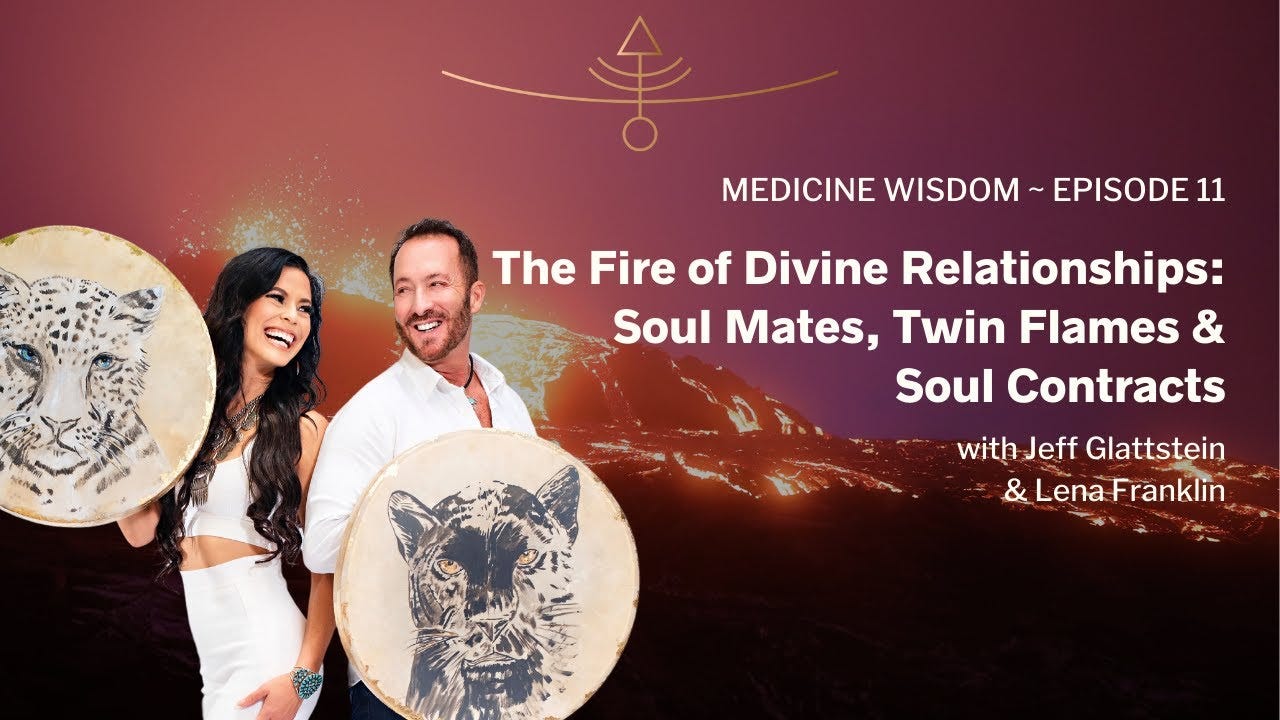Why do so many couples work together in the psychedelic industry?
Is it a blessing, or a red flag?
Five years ago Steve and his wife Austin left Vancouver and bought a house on an island nearby. Their daughter had grown up, they were turning 40, and it was time for something new - they decided to open a psychedelic retreat centre.
Their centre, Enfold, offers three-day 5-meo-DMT retreats costing $3500, and they also work with 3MMC and 4-ACO-DMT. Clients come and stay in their home, Austin cooks for them, and the couple facilitate the sessions together. Steve says: ‘it's one of the most challenging and most beautiful things I think either of us have ever done’.
The fact they’re a couple is ‘the defining factor of our work’, Steve says:
I think that's why our work has been so impactful and what people are coming for. They've heard that there's something incredibly special about doing this intimate work in this couple's home, rather than in a big retreat centre.
On their website, they write: ‘We’re in our mid-40s, and have raised a daughter and have a number of spiritual children (of all ages) that we support and care for.’
What, I asked, did they mean by ‘spiritual children’? Steve tells me:
Part of our healing work is having people in our home and showing them what it feels like to be cared for. There's a maternal / paternal energy going on. It’s not overt, but we know that that's part of the process of healing family wounds. A lot of the people we work with don't have a sense of home. They don’t have that core sense of safety in the world that comes from knowing that Mom and Dad love me. We say to our clients you all have a spiritual home here, always. This is our way of giving back to the world and healing a lot of inner children.
What are the challenges of working together as a couple? Steve says:
We have people in our home quite often. We are holding a lot of space for a lot of people. I can’t imagine doing this work with young children in the home.
The work is intense, and could lead to burnout. ‘We pace ourselves, we take June and December off, only do 2-3 retreats a month, and we are never in medicine with clients. We draw very clear boundaries around that. And our relationship always comes first before the project.’
Steve says there’s also a risk that they buy into their clients’ transference:
I think one of the biggest risks is the amount of projection that is put on us by our clients. It's not a real thing but it could be easy to buy into it and think you’re the shit. Either you get totally sucked into that, or the weight of projection makes the flaws in your relationship seem impossible to overcome. If we were pretending to be a great couple and masking a tonne of resentment, all we'd be doing is recreating a lot of people's childhoods where the parents were pretending that everything was fine but they were fighting in the backroom.
The other big risk of working as a couple is that you become ‘a single unit’ so don’t act as checks on each other’s bad tendencies. Steve says: ‘If things start skewing ethically and going wrong somehow, both of you might be swept up in that and not see the forest for the trees.’
The couple have tried to put other checks in place:
I think that for a couple to do this work, there has to be a really high level of personal work done both as a couple and individually. We both have therapists or coaches, we also have a couple of people who are advisors to us that we have specifically asked to continually challenge us in our ethics and decision-making around how we do things. And we’ve built a peer network, which is really critical for checking in when things go wrong. This is high risk work. That should be accepted.
NB Ecstatic Integration does not accept payment from any psychedelic companies nor does it advocate using their services - using psychedelics has some reported benefits, but also health risks.
All the psychedelic couples
Steve and Austin are not alone. There are a lot of couples who work together in the psychedelic industry, especially as co-facilitators.
In Europe, Swiss psychiatrist Samuel Widmer ran a psychedelic therapeutic community called Cherry Blossom with his wife Daniele Nicolet. Several couples also worked together in European psychedelic therapy, such as Friedrike and Konrad Fischer, Heike and Peter Hess, Verena Widmer and Peter Oehen, and Peter Gasser and Anke Roskamp.
Married couples also loom large in the American psychedelic industry. At the Multidisciplinary Association of Psychedelic Science (MAPS), the MDMA for PTSD trials in the US were led by two psychedelic therapist couples - Bruce Poulter and Marcela Ot’alora, and Annie and Michael Mithoefer, MAPS’ trial in Canada were part-run by another couple, Donna Dryer and Richard Yensen. And its trial in Israel were led by another couple – Ido Siemion and Keren Tzarfaty. You could say married couple therapist teams are the implicit norm in MAPS’ model of psychedelic therapy.
There are many psychedelic retreats or facilitator training schools run by couples – AWE in Colombia is run by Lila and Mar Vega, the EAST Institute in Atlanta is run by Jeff Glattstein and his partner Lena Franklin, the Centre for Consciousness Medicine was run by Francoise Bourzat and her partner Aharon Grosbard; ATMA Journey in Canada emerged out of underground ceremonies run by David and Natalie Harder; Sowilo in Mexico was run by Bruno and Ayme Cluzel, Inner Trek in Portland is run by Tom Eckert and his wife Rachel Aidan, MycoMeditations in Jamaica is run by Justin and Abbie Townsend, Iboga Root Home in Mexico is run by Christopher Laurence and Mari Smith, The Matter is run by Marieke van der Spek and Eric van der Hoef, Polaris is run by Veronika Gold and Erik Sienknecht…I could go on.
Then there are psychedelic churches run by couples, like Soul Quest, founded by Christopher and Verena Young, or the Divine Assembly, run by Steve and Sara Urquhart, or several Santo Daime churches run by husband and wife teams.
There are couples who run ketamine clinics, like Phil Wolfson and Julane Andries; couples who found psychedelic companies, like Ekaterina Malievskaia and George Goldsmith, founders of Compass; psychedelic research couples, like Dustin and Rochelle Hines; psychedelic integration couples, like Ryan Beauregard and Sara Gael of Zendo Project, psychedelic NGO couples like Peter Hunt and Tania de Jong of Mind Medicine Australia, and psychedelic philanthropist couples like Steve and Genevieve Jurvetson, Steve and Alexandra Cohen, and Eliza and Peter Palandjian.
Finally there are the couples who worked together in the annals of psychedelic history – Aldous and Laura Huxley, John and Toni Lilly, Marcia Moore and Howard Alltounian, Sasha and Ann Shulgin, Gordon and Valentina Wasson, George Greet and Requa Tolbert (MDMA therapists from the 1980s), Stan Grof and Joan Halifax, Stan Grof and Christina Grof, Stan Grof and Brigitte Grof…






So why do so many couples work together in the psychedelic industry?
Certain industries often feature married couples working together – particularly the hospitality sector (small hotels, bed-and-breakfasts and restaurants are often family-run labours of love), and the faith sector – many churches are run by husband-and-wife teams. Psychedelic centres are something between a church and a bed-and-breakfast, so it makes sense they’d often be run by couples. However, it’s much rarer for couples to work together in therapy, and you can see why. Imagine if, every week when you went to see your therapist, it was a husband and wife team.
So why are there so many couples working together in psychedelic-assisted therapy?
Peter Gasser is a Swiss psychedelic therapist and researcher, who has run LSD therapy sessions with his wife Anke since the early 1990s. He says:
I think it is mainly because most psychedelic therapists came from the underground. When people do non-legal work, you have to have someone at your side that shares your goals and values, and who can support a confidential situation. It’s not a good idea to do underground work when your partner is completely against it. So you need someone who agrees with it, and maybe that develops into the next step - ‘let's do it together’ I think couples working together may be a historical thing that passes as the psychedelic industry shifts to a legal overground model.
But in fact, one still sees many couples working together in legal retreats or psilocybin centres. Why are there still so many psychedelic couples? My theory is that psychedelia is a bit like evangelical Christianity – it’s an all-consuming passion, an experience, belief system and culture that is often at odds with secular mainstream culture, so it helps if both couples are into it.
Peter Gasser says:
If you are so into it that it’s one of your highest values, and your partner is totally uninterested, it's really separating. This work is a commitment, it's not a nine-to-five job. For partners working together, it's sharing something of high value. Besides the children my wife and I have together, this is the most valuable thing we do together. And also the most satisfying in some ways.
But is it a good idea for couples to work together – for them, and for their clients?
‘Besides the children my wife and I have together, this is the most valuable thing we do together. And also the most satisfying in some ways.’ - Peter Gasser
The advantages of psychedelic couples
The first obvious advantage is you get to share the magical mystery world of psychedelics. Your marriage gets all the added rocket fuel of taking mind-altering chemicals together, and sharing a ‘sacred mission’. That can bring you closer together, although it could also be a risk I suppose, if the marriage relies on peak experiences.
Cole Butler , a mental health counseller at Inner Life Adventures, tells me:
My partner and I were just talking last night about how our psychedelic experiences together really brought us together. We met while both working at a psychedelic clinic. We were brought together through our shared interest in the work. MDMA journeys helped break down physical/intimacy barriers. Then a shared LSD journey helped us realize that we wanted to be life partners and have a baby together. We had only known each other about six months when we decided to have the baby, and now our daughter is 5 months old. We have a love that is genuine and authentic and that seems to be deeper than what I see elsewhere.
Anna Milaeva has worked with her partner Dario Giuffrida for the last seven years, holding San Pedro ceremonies and setting up an Internal Family Systems coaching company:. She says;
Working together in this space is one of the biggest gifts and challenges, and allows us to be truly spiritual partners. It always feels like it's just the beginning as new depths and dimensions open up daily.
From the clients’ point of view, couples working together could also limit the possibility of boundary violations between clients and therapists (unless the couple are indiscriminately polyamorous). Carolyn, one of our readers, says as a client she feels safer when a couple runs a ceremony:
It can be helpful when these spaces are led by couples because it (sometimes) dissuades problematic romantic or sexual vibes forming or being acted upon between facilitator and participants.
Paul F. Austin of Third Wave thinks couples create safe trusting containers for psychedelic work:
So much of the efficacy of psychedelic work comes from safety and trust. Couples have deep trust between them, so the container created through that sense of trust will naturally be more efficacious for deep psychedelic work.
Potential ethical issues with psychedelic couples working together
What are the potential risks or disadvantages of psychedelic couples for clients and the couple themselves? Well, consider some of the psychedelic therapy scandals of the last few years. A lot of them involved psychedelic therapy couples who work together.
There’s the case of Francoise Bourzat and Aharon Grossbard, who blurred boundaries between work and home life at their Centre for Consciousness Medicine, so that clients became lovers and domestic help.
There’s the case of Donna Dryer and Richard Yensen, who invited a former MDMA patient to live with them and work for them, and who Richard then encouraged to have sex with him as part of the patient’s therapeutic journey, according to the patient’s testimony - she subsequently accused him of sexual assault (more on it here).
There’s the ongoing trial of David Harder, a psychedelic facilitator and co-founder of ATMA Journey, who was charged with sexual assault earlier this year (he denies it). He ran psychedelic and tantric ceremonies with his wife Natalie.
Another ongoing trial involves Jeff Glattstein, who founded the EAST Institute in 2021 with his ‘twin flame’ Lena Franklin. Jeff has been accused of sexual assault by three women (he denies it). When confronted by the women, Glattstein and Franklin ‘responded with denials, deflections, and dismissals’, according to the womens’ complaint.
Clearly, things can sometimes go wrong in psychedelic work. Is there something about couples working together that can make this more likely?






